
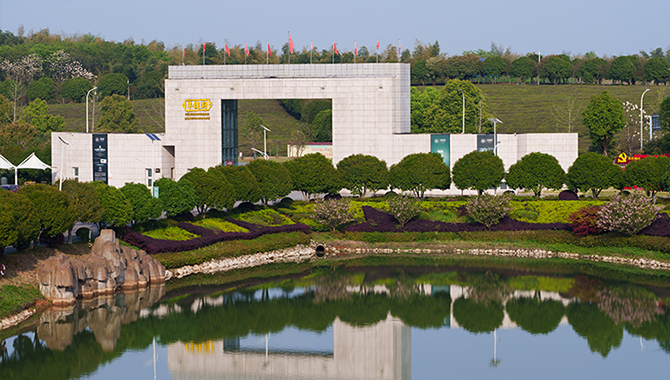
Yang Lou Dong Tea Industry Co., Ltd. (hereinafter referred to as the Company) is a state-owned holdings subcompany under Hubei Qingzhuan Tea Industry Development Co., Ltd. Founded in July 2005, the Company is a state-level agricultural leading enterprise that integrates tea plantation, tea product research & development, production, sales, and tea house chain operation.
In the core tea regions, the Company owns over 2,600mu’s classy tea gardens. The total area of tea gardens managed under the company + cooperative mode attains nearly 20,000mu. In its tea cultural eco-park, the Company has established a modernized tea production, processing, and research base. It has taken a lead in passing the certification of such quality systems as ISO: 9001 and HACCP among its domestic counterparts. “Quality first” is a principle the company keeps sticking to.
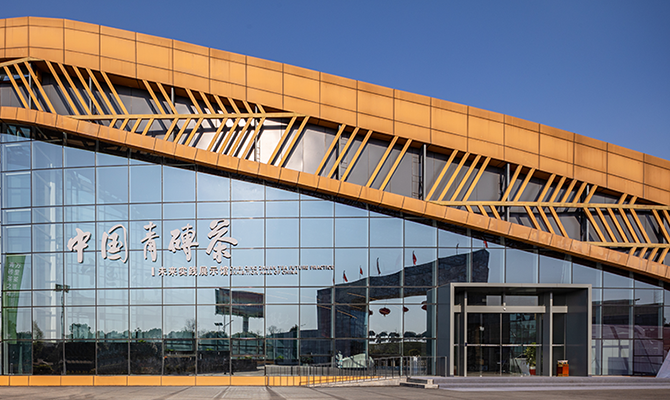
The Company possesses a time-honored brand, Yang Lou Dong. This is a Chinese famous brand. The tea products launched under the brand are overwhelmingly Qing (Mi) Zhuan Tea. There’re three categories, namely dark green tea, black tea, and green tea. In addition to them, the Company’s products also include all sorts of spiced tea products, such as the herbal tea, flower tea, and fruit tea. Its various products have been certified as “Geographical Indications Protection Products of the People’s Republic of China”, “Ecological Origin Protection Products”, and “Green Organic Food”. And some products have repeatedly won golden awards of quality both at home and abroad. Wide acclaim and trust have been won from dealers and customers around the world.
Adhering to the core values of “revitalizing the tea industry and benefiting the general public”, the Company undertakes the mission of “revitalizing and developing Yang Lou Dong Tea” and operates its brand with the ideas of “origin of the Qing Zhuan Tea along Tea Road” and “Chinese dark tea welcomed by European and Asian countries in three centuries”. Under the business philosophy of “creating brands through quality and occupying the market with standards”, it devotes itself to becoming a Chinese tea enterprise that has the highest competence and brand influence across the world.
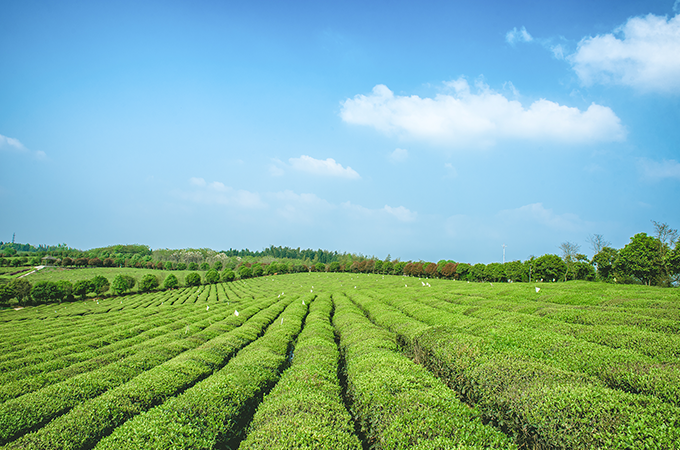
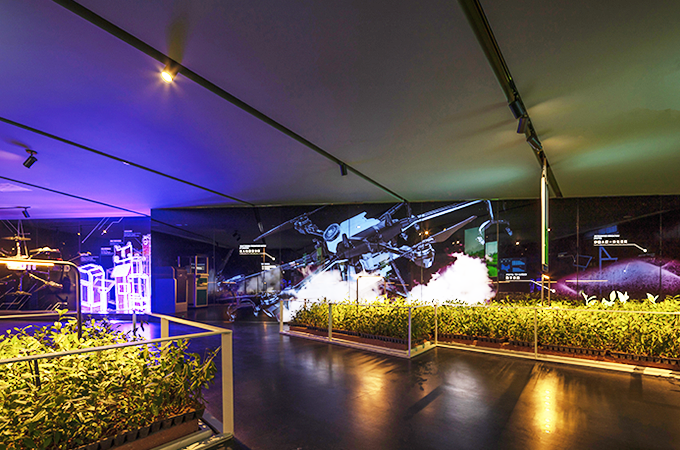
The tea produced in Chibi consists of three types, namely green tea, black tea, and Qing Zhuan Tea. The green tea is plucked on Grain Rain (middle April of the calendar year), black tea on Grain Buds (middle May), and Qing Zhuan Tea from the Start of Autumn to Fall Equinox (August to September). Qing Zhuan Tea usually undergoes following steps of processing: preliminary processing, pile fermentation, re-processing (screening), compression, and drying.
Preliminary processing: fixation — rolling— drying
Pile fermentation: small-pile fermentation of the Lao Qing Tea after preliminary processing
Aging: when tea base shows the color of reddish tan, small piles are combined to form larger piles. Intersecting channels are formed to ventilate and dry the tea so that the tea base could undergo natural aging.
Re-processing is to dissemble the fermented raw materials for inner tea, screen them, cut them into fine particles, and remove sands therein.
Compression: Lao Qing Tea is first steamed at proper ratios. Inner and outer tea materials are put into molds and compressed with surface and bottom plates.
Drying: drying is applied to downregulate the water content to be 11.5% or below,
When being aged for over three years, Qing Zhuan Tea would enter phase 1 transformation. By then, date-like aroma could be smelled and the tea begins presenting significant sweet aftertaste. The taste is far better than that of newly harvested tea. If being preserved for another two years, the tea’s taste would be further improved. For Qing Zhuan Tea, aging should last three years at least. The raw material of Qing Zhuan Tea in Yang Lou Dong is left for fermentation for at least 3 years, thus the finish tea tastes profoundly aromatic and is a piece of artwork with high value for enjoying, collection, appreciation, and presentation.
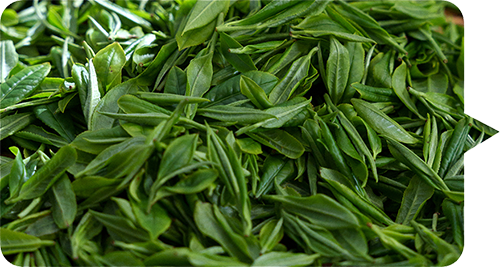
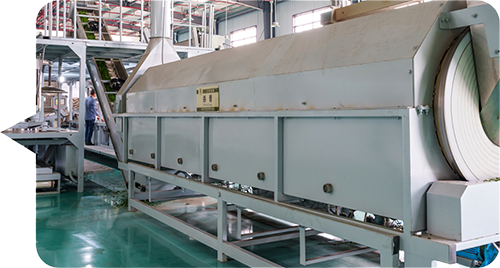
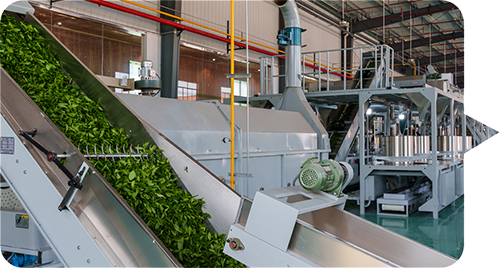




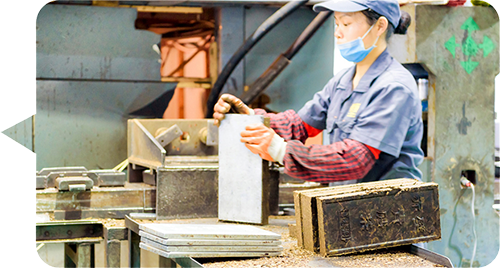
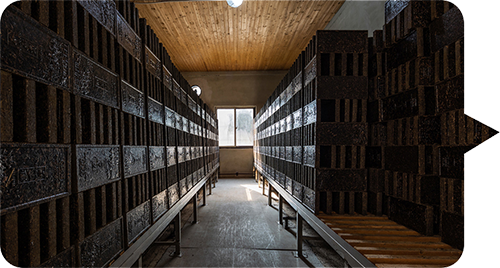
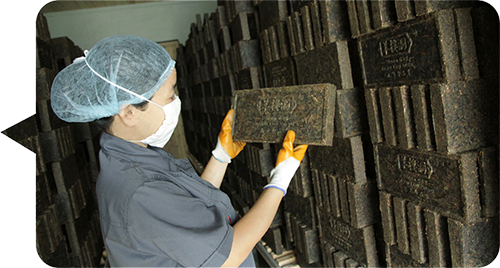




Yangloudong Warehouse Logistics is an integrated logistics service based on a logistics management system, from the warehouse to consumers. Yangloudong Warehouse Logistics can provide a series of storage, transportation, distribution, packaging and other services. The following are the main services of Yangloudong Warehouse Logistics:
Warehousing services: including various types of warehousing services such as refrigeration, drying, and regular storage.
2. Transportation services: including various transportation methods such as whole vehicle, less than truckload, express delivery, air freight, sea freight, etc.
3. Distribution services: including product picking, assembly, and distribution according to orders.
4. Packaging services: including various packaging services such as product packaging, outer packaging, and customized packaging.

Yang Lou Dong Tea Industry has always attached great importance to independent R&D and industry-university-research cooperation. We’ve made great scientific and technological progress in both tea base construction and new product development. The company won 2 provincial-level scientific research awards (including a second prize of Hubei Provincial Scientific Advancement Award), 17 national patents, and 1 high-tech product award. It’s among the first batch of provincial school-enterprise cooperation units and a provincial Zhuan Tea academician workstation.
Yang Lou Dong Tea Industry has long been engaged in improving and developing scientific research. The company is in the list of Hubei Provincial 3rd Intellectual Property Right Construction Demonstrating Enterprises certified by Hubei Intellectual Property Bureau, Hubei Provincial Academician Workshop Demonstrating Unit issued by Hubei Association for Science & Technology, Hubei High-Tech Talent Workstation and Hubei High-Skill Talent Training Base by the Department of Human Resources and Social Security of Hubei Province, Yang Lou Dong Tea Culture Eco-Industry Spark Entrepreneurship (Provincial), High-Tech Enterprise, School-Enterprise Co-Founded Qing Zhuan Tea R&D Center by the Department of Science and Technology of Hubei Province, and Xianning Zhuan Tea Industrial Technology Research Institute and Xianning Qing Zhuan Tea Engineering Technical Research center by Xianning Bureau for Science & Technology.
Strict quality management and control systems have been executed on production & processing environment and products in addition to constant innovation, research, and development. The company has passed certification of several international standard systems such as ISO9001, ISO: 14000, 180:22000 and HACCP. It passed also the EAC certification that allows its products to be sold to the European and Russian markets. We’ve insisted on “quality first” export principle regarding product quality.
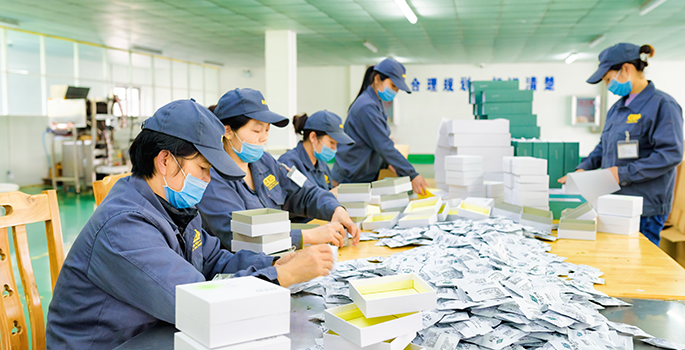
Adopting specialized, integrated, standard, and marketized patterns, the company integrates the whole industrial chain covering base management, tea plucking, preliminary processing, further processing, compression and drying, deep processing, package production and supply, storage and logistics, and distribution. Along the supply chain, there’re over 200 collaborative enterprises in upstream, midstream, and downstream links. They’re all demanded to abide by standard and strict product and service rules. The highly competitive supply chain with outstanding efficiency, quality and cost performance is the driving force behind the market expansion and development of Yang Lou Dong Tea Industry.
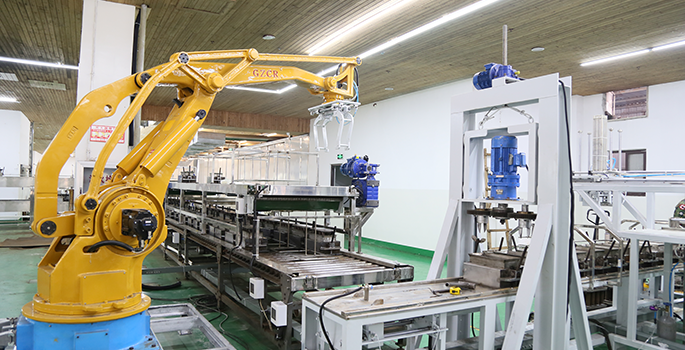
We’re going to create a classy corporate-level scientific research lab and a dedicated product R&D team. As for product strategy, refined SKU is implemented to promote independent products. The company focuses on the compressed tea products dominated by Qing Zhuan Tea and Mi Zhuan Tea, as well as raises the market occupancies of gift tea and foodstuff tea. It’s also further advancing into deep processing of all the products. In the meanwhile, raw tea is further explored. Regarding techniques, digital classification system is set up to further improve standard assembly capacity. While sticking to craftsmanship, we are actively implementing such product strategies as standardization and simplification with the goal of taking a lead in such submarkets as compressed tea and fermented tea.
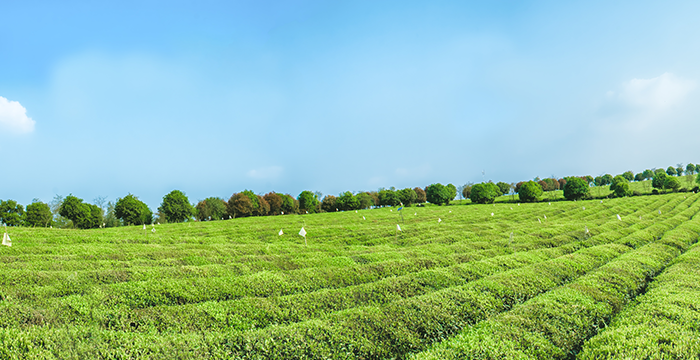
1、Stable supply-demand relationship
China is a country of mass tea production. Owning vast land area, domestic tea supply can basically meet the normal market demand and guarantee export at the same time. Thus, domestic tea market operates rather smoothly.
2、Complete industrial chain
In domestic tea industry, a complete industrial chain system has been established from the upstream tea plantation to later sales network. Moreover, we’ve a variety of tea products that could meet the demand of different customers in the market.
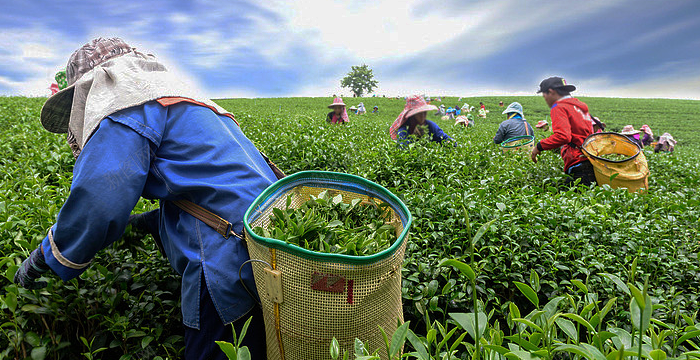
3、Changes in sales patterns
With rapid development of e-commerce and special situations in recent years, the tea industry is no longer limited to offline store sales. Instead, a business mode integrating online and offline sales has been developed. We also witness great potential in the new retail industry.
4、Promising future of green tea market
Tea industry in China develops by leaps and bounds with increasingly higher tea yield. Both demand and supply quantities of green tea in the market appear substantial. The diversity in species greatly satisfy the varying demands of customers. Moreover, green tea is largely for export sales.
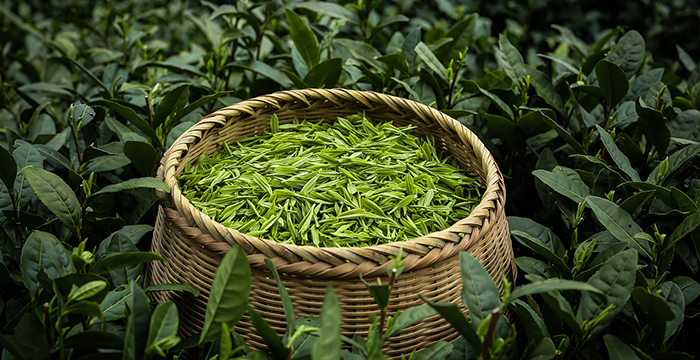
5、Constant technical progress
Professional techniques have been developed during tea production and making. Accordingly, the tea flavors are increasingly richer, which brings in intense drinking experience among the customers. Sales of quality products in the market has won great acclaim from the customers.
The tea market has a quite promising future. To adapt to the constant development of market, some enterprises must explore the market demand and change their business strategies so as to gain higher earnings from the market.

回到顶部